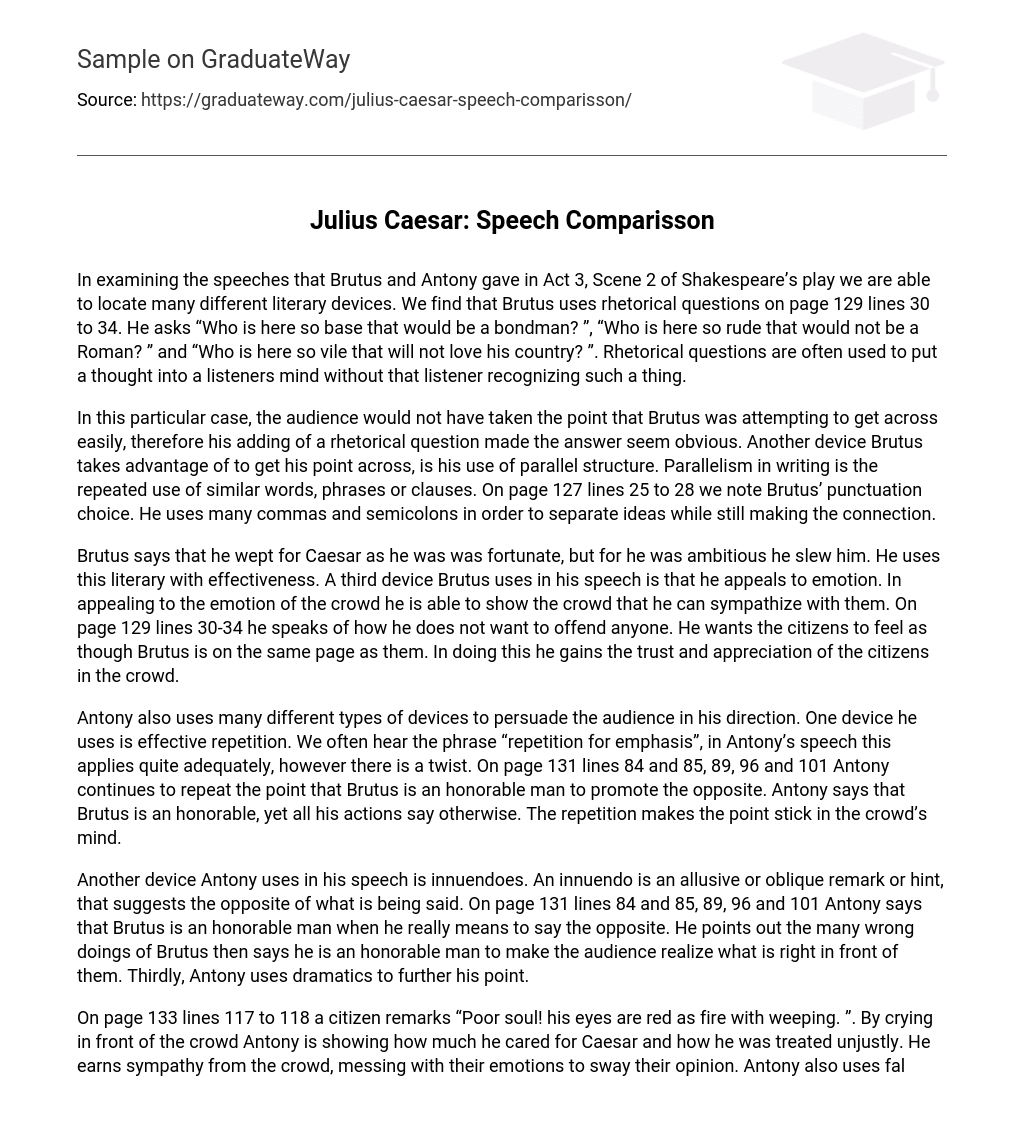When examining the speeches by Brutus and Antony in Act 3, Scene 2 of Shakespeare’s play, we find various literary devices. On page 129, lines 30 to 34, Brutus employs rhetorical questions. He inquires, “Who is here so base that would be a bondman?”, “Who is here so rude that would not be a Roman?”, and “Who is here so vile that will not love his country?”. Rhetorical questions are commonly utilized to implant a thought in the listener’s mind without their awareness.
In this specific situation, the point that Brutus was trying to convey would not have been easily understood by the audience. As a result, he decided to incorporate a rhetorical question, which made the answer appear obvious. Additionally, Brutus utilizes parallel structure as another tool to effectively convey his message. Parallelism in writing involves the repeated use of comparable words, phrases, or clauses. This can be observed on page 127, lines 25 to 28, where Brutus carefully selects his punctuation. By using numerous commas and semicolons, he successfully separates ideas while maintaining their connection.
Brutus skillfully uses multiple literary devices in his speech, including the declaration that despite mourning Caesar’s fate, he had to slay him due to his ambition. This effectively appeals to the emotions of the audience, demonstrating his ability to comprehend and share their sentiments. On page 129, lines 30-34, Brutus accentuates his desire not to offend anyone, aiming to convince the citizens that he supports their wishes. Through this approach, he earns the trust and gratitude of the crowd.
Antony employs various techniques to sway the audience in his favor. Among these is the use of effective repetition. While we often hear the phrase “repetition for emphasis,” Antony takes it a step further in his speech. On page 131, lines 84 and 85, 89, 96, and 101, he repeatedly emphasizes that Brutus is an honorable man, but with a twist. Antony suggests that despite Brutus being labeled as honorable, his actions speak otherwise. By repeating this point, Antony ensures that it resonates with the crowd.
Antony employs multiple devices in his speech, including innuendoes, allusive or oblique remarks that suggest the opposite of what is being said. On page 131, lines 84 and 85, 89, 96, and 101, Antony ironically describes Brutus as an honorable man, despite intending to convey the opposite. By highlighting Brutus’s wrongdoings and then declaring his honorability, Antony aims to make the audience recognize the truth that is right in front of them. Additionally, Antony utilizes dramatics to reinforce his argument.
The citizen remarks on page 133 lines 117 to 118. The citizen notices that Antony’s eyes are red from crying and expresses sympathy by saying, “Poor soul! his eyes are red as fire with weeping.” Antony’s display of emotion in front of the crowd shows his deep care for Caesar and highlights the injustice he faced. By eliciting sympathy, Antony manipulates the emotions of the crowd to garner their support. Additionally, Antony employs false modesty in his speech, as seen on page 139 lines 216 to 217. He states, “I come not, friends, to steal away your hearts: I am no orator, as Brutus is; But, as you know me all, a plain blunt man.”
Antony establishes his equality with the people by positioning himself on their level. He refers to the crowd as “friends” and portrays himself as “a plain blunt man”. Instead of placing himself above others, he brings himself down to their level to foster relatability and empathy. By employing this approach, he enables the audience to connect with him on a deeper level. Both Brutus and Antony deserve praise for their ability to persuade the crowd and garner support for their respective beliefs. They both employed various effective tactics to achieve this.





